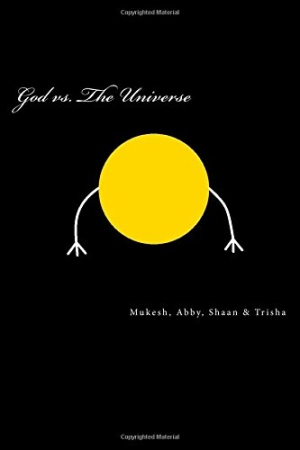
God vs. The Universe
Essays on Religions, Spirituality, and More
This creative foray into religious inquiry from a layman’s perspective bridges distances between people across the ideological spectrum.
A brief meditation on the nuances of various religious traditions, Mukesh Prasad’s God vs. the Universe is a reimagining of belief from a scientific perspective. Prasad’s creative interpretations seek to put ancient beliefs into conversation with reason and modernity, with sometimes provocative results.
Prasad prefaces his project by professing respect for the religious traditions he discusses, if not belief in supernatural origins for any of them. “Trying to understand [their] natural origins,” he says, “can go a long way towards bringing the pieces of humanity together.” Subsequently, religious concepts are divested from a sense of the magical, and Prasad’s first question becomes that of Jesus’s proclaimed divinity.
Prasad’s reconciliations of scriptural concepts with the scientific method often take his work in highly imaginative directions; his presentation of Christianity is no exception. Prasad prefers an understanding of Jesus’s “resurrection” more suited to Shakespeare than scripture, in which the religious leader was near death, rather than actually dead, when he was removed from the cross. The first generation of Christians, in Prasad’s presentation, were often those who lived through crucifixion, putting concepts of life after death into new light.
Such notions are piquing, even if they seem to stretch the limits of historical inquiry. Many of the book’s claims seem inadequately conversant with extant scholarship, as with conversations surrounding the Hebrew renderings of “Messiah,” “Moses,” and “Jesus.” Presentations of Second Temple and modern Judaism, particularly around the roles of temple priests and notions of the afterlife, are similarly out of sync.
Islam and Hinduism are also staged in respectful but creative manners. Prasad presents both as teeming with potential, though stymied by tradition. His calls for moves away from doctrine sometimes rely upon misunderstandings of the traditions, however. Islam is presented as a “warrior discipline” not “equipped for science,” despite centuries of scientific development in the Muslim world. Similarly, Hinduism’s reverential posture toward cows is presented in literal, rather than symbolic, terms. Such decisions may limit the book’s ability to persuade those within these religious traditions.
The aims of Prasad’s work remain sympathetic throughout, and he should have little trouble convincing audiences of the necessity of rising above ideological differences. His writing brims with conviction, even while his tone seems out of touch at times (“These days … [young adults have] gadgets and their new releases, there are cute kitten pictures, there are new clothings,” he writes of modern distractions). Errors arise mostly when he attempts to present religions that are not his own.
God vs. the Universe is a creative foray into religious inquiry from a layman’s perspective, provoked by a desire to bridge distances between people across the ideological spectrum.
Reviewed by
Michelle Anne Schingler
Disclosure: This article is not an endorsement, but a review. The publisher of this book provided free copies of the book and paid a small fee to have their book reviewed by a professional reviewer. Foreword Reviews and Clarion Reviews make no guarantee that the publisher will receive a positive review. Foreword Magazine, Inc. is disclosing this in accordance with the Federal Trade Commission’s 16 CFR, Part 255.
